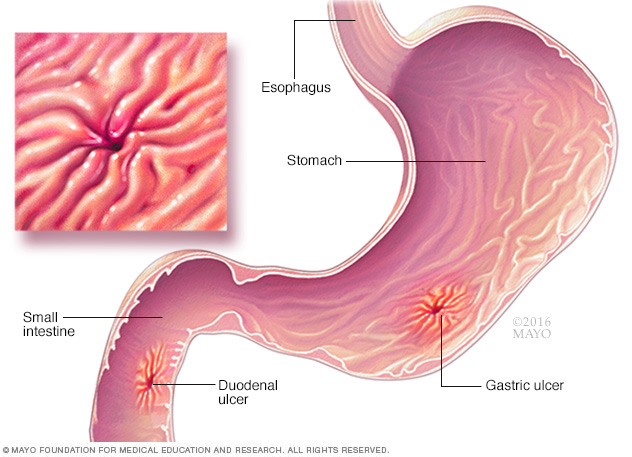
Peptic ulcer -
Peptic ulcers are open sores that develop on the inside lining of your stomach and the upper portion of your small intestine. The most common symptom of a peptic ulcer is stomach pain.
Peptic ulcers include -
Gastric ulcers that occur on the inside of the stomach Duodenal ulcers that occur on the inside of the upper portion of your small intestine (duodenum) The most common causes of peptic ulcers are infection with the bacterium Helicobacter pylori (H. pylori) and long-term use of aspirin and certain other painkillers, such as ibuprofen (Advil, Motrin, others) and naproxen sodium (Aleve, Anaprox, others). Stress and spicy foods do not cause peptic ulcers. However, they can make your symptoms worse.
Symptoms -
Burning stomach pain
Feeling of fullness, bloating or belching
Fatty food intolerance
Heartburn
Nausea
What causes ulcers?
Helicobacter pylori bacteria (H. pylori)
H. pylori is the most common cause of gastric and duodenal ulcers. This bacterium damages the mucus that protects your stomach and small intestine, allowing for stomach acid to burn through. An estimated 30 to 40 percent of Americans get H. pylori, according to the National Institute of Diabetes and Digestive and Kidney Diseases (NIDDK).
It’s unclear how this bacterium spreads, but researchers believe it’s mostly through unclean food, water, and eating utensils. People who carry H. pylori can also spread it through direct contact.
Many people get this bacterial infection as a child, but it rarely develops into a peptic ulcer. In fact, most people don’t see symptoms until they’re older, if at all.
Medications -
People who use or rely on nonsteroidal anti-inflammatory drugs (NSAIDs), such as aspirin, ibuprofen, and naproxen sodium, are more likely to develop peptic ulcers. NSAIDs can irritate and damage your lining. Acetaminophen, or Tylenol, isn’t included on this list.
Other conditions -
A rare condition known as Zollinger-Ellison syndrome can cause gastric and duodenal ulcers. This condition causes cancerous and noncancerous tumors to develop in the stomach and duodenum.


